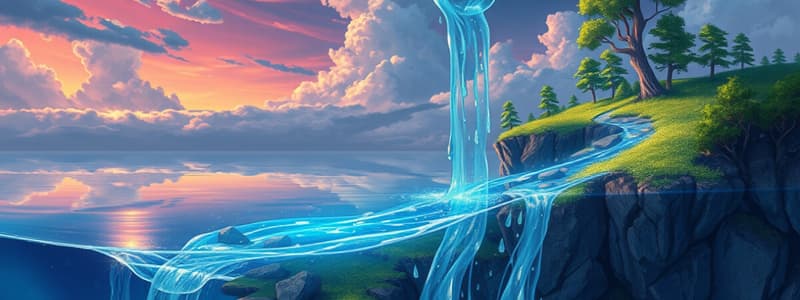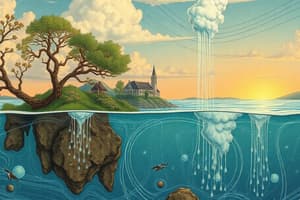Podcast
Questions and Answers
What is the water cycle?
What is the water cycle?
The movement of water from the ground to the air and back to the ground by evaporation, condensation, and precipitation.
What is evaporation?
What is evaporation?
During the water cycle, liquid water is heated and changed to a gas.
What is condensation?
What is condensation?
During the water cycle, the gas is cooled and changed back to a liquid.
What is precipitation?
What is precipitation?
What drives the water cycle?
What drives the water cycle?
What does the term 'conserve' mean?
What does the term 'conserve' mean?
What is pollution?
What is pollution?
What is a drought?
What is a drought?
What is a flood?
What is a flood?
Water changes ___ to create the water cycle.
Water changes ___ to create the water cycle.
What happens to water vapor in the upper atmosphere?
What happens to water vapor in the upper atmosphere?
What occurs when the air cannot hold condensed water anymore?
What occurs when the air cannot hold condensed water anymore?
What is accumulation in the context of the water cycle?
What is accumulation in the context of the water cycle?
What is salt water?
What is salt water?
Where can fresh water be found?
Where can fresh water be found?
What causes water pollution?
What causes water pollution?
What does conservation mean regarding water use?
What does conservation mean regarding water use?
What is ground water?
What is ground water?
What is 25 degrees Fahrenheit best for?
What is 25 degrees Fahrenheit best for?
What temperature is referred to as freezing by weather forecasters?
What temperature is referred to as freezing by weather forecasters?
Flashcards are hidden until you start studying
Study Notes
Water Cycle Overview
- The water cycle involves the movement of water from the ground to the air and back again, driven by evaporation, condensation, and precipitation.
Key Processes
- Evaporation: Liquid water heats up, transforming into gas (water vapor).
- Condensation: Water vapor cools and changes back to liquid, forming clouds.
- Precipitation: Liquid or solid water (rain, snow, hail) falls to the ground when clouds become heavy with moisture.
Energy Source
- The sun provides the energy needed for evaporation, initiating the water cycle.
Water Forms
- Water Vapor: The gaseous state of water formed during evaporation.
- Condensed Water: Collects in clouds before falling as precipitation.
- State of Form: Water changes between liquid, gas, and solid phases in the cycle.
Precipitation Types
- Forms include snow, sleet, rain, and hail.
Accumulation
- Precipitation gathers in bodies of water such as lakes, rivers, and reservoirs, replenishing water sources.
Water Sources
- Salt Water: Primarily found in oceans and brackish water.
- Fresh Water: Available from rivers, lakes, and reservoirs.
Impact of Pollution
- Water pollution, caused by substances like oil and fertilizers, reduces usable water and affects ecosystems.
Environmental Concerns
- Drought: Extended periods without precipitation lead to water shortages and environmental stress.
- Flood: Excessive rainfall can result in flooding, overwhelming land and water systems.
Conservation Practices
- Conservation involves using only necessary amounts of water to prevent waste and protect resources.
Temperature Significance
- 32 degrees Fahrenheit marks freezing temperatures, critical for understanding weather impacts on water.
Ground Water
- After precipitation, some water is absorbed into the ground, providing vital drinking water for plants and animals.
Studying That Suits You
Use AI to generate personalized quizzes and flashcards to suit your learning preferences.




